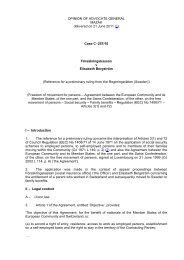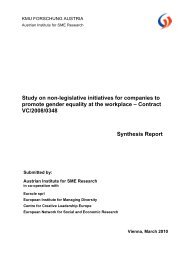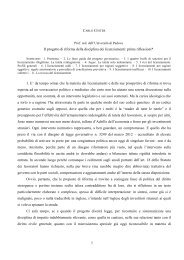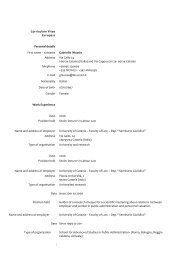Full text - European Trade Union Institute (ETUI)
Full text - European Trade Union Institute (ETUI)
Full text - European Trade Union Institute (ETUI)
Create successful ePaper yourself
Turn your PDF publications into a flip-book with our unique Google optimized e-Paper software.
Temporary agency work in the <strong>European</strong> <strong>Union</strong><br />
Principle of equal treatment (Articles 2 and 5)<br />
State of transposition<br />
Article 2 of the Directive sets its aim, namely ensuring that the principle<br />
of equal treatment provided for by Article 5 is applied to temporary agency<br />
workers.<br />
The legislation of some Member States provides a principle of equal treatment<br />
with broad scope, such as that of Lithuania, where there are no specific rules<br />
designed for this category of workers; Romania (pre-existing principle); and<br />
Norway (will come into force in January 2013). This principle could be the<br />
result of implementation of the Directive or a pre-existing principle.<br />
In Belgian law, the equal pay for equal work/job principle applies independently<br />
of the temporary nature of the assignment, except if the collective<br />
agreement signed by the national bipartite commission for temporary agency<br />
work (also signed by the King) foresees equivalent advantages. However, the<br />
new bill proposed by the Belgian parliament lays down that the principle of<br />
equal treatment applies to temporary agency workers, too. The <strong>text</strong> itself simply<br />
transposes into Belgian law the rule of Article 5 paragraph 1 of the Directive<br />
in terms of equal treatment, protection of pregnant women and nursing<br />
mothers.<br />
According to Polish law (Art. 15.1 of the Act on employment of temporary<br />
workers) a temporary agency worker working at the user undertaking cannot<br />
be treated less favourably concerning working conditions and other terms of<br />
employment than employees employed directly by the user undertaking for<br />
the same or similar job. Regarding pay, temporary workers also have the right<br />
to equal remuneration in comparison to regular employees of a user employer<br />
performing the same or similar job (Article 15 of the temporary employment<br />
act). The remuneration of temporary workers is paid by an agency, but on the<br />
basis of information given by a user employer. Provisions on remuneration<br />
regulation or collective agreements covering a user employer stipulating that<br />
remuneration of temporary workers is lower are unacceptable. In practice, it<br />
may happen that temporary workers perform such jobs that cannot be compared<br />
to any others performed by regular workers at an establishment and<br />
therefore obtain lower remuneration than that which would have been proposed<br />
to a regular employee.<br />
In Slovenia, the labour market regulation act lays down that the temporary<br />
work agency acting as employer has to ensure the worker all the rights arising<br />
from employment that the worker is entitled to in accordance with regulations<br />
governing employment relationships. This is meant to guarantee equal<br />
treatment. The user undertaking also has to comply with those regulations<br />
during the assignment.<br />
In Lithuania, the principle of equal treatment is vaguely formulated and leads<br />
to practical difficulties, for example, to define the salary a temporary agency<br />
WP 2012.13 37
















